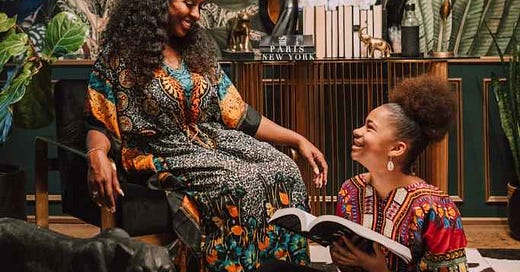Our 2023 series of articles on Kwanzaa and Christmas was well received. We are continuing this series during the 2024 holiday season. December is here, marking the close of another year filled with perseverance and discovery. We know this season brings both joy and busyness, and we are here to help you stay grounded, connected, and inspired.
Nurturing Justice and Renewal: The Intersection of Christmas and Kwanzaa
The holiday season is a time for connection, reflection, and renewal. For many, Christmas and Kwanzaa offer complementary opportunities to celebrate both faith and culture while addressing enduring questions of justice, equity, and hope. These traditions, though distinct in origin, provide shared frameworks for fostering empathy, collective responsibility, and transformative action in our communities.
Christmas, deeply rooted in Christian theology, centers on the miraculous birth of Jesus—a child born under precarious conditions, to parents navigating displacement and the mandates of imperial rule. It is a story that resonates profoundly in today’s world, where countless families face similar struggles of migration, vulnerability, and systemic inequity. The Christmas narrative invites reflection on resilience, divine intervention, and the radical hope that something new and redemptive can emerge from even the most challenging circumstances.
Kwanzaa, created in 1966 during the Black Freedom Movement, reflects a collective yearning for cultural affirmation and self-determination. Rooted in African traditions, Kwanzaa celebrates the strength of community and the principles necessary for liberation: unity, self-determination, collective responsibility, cooperative economics, purpose, creativity, and faith. These seven principles, known as the Nguzo Saba, inspire a profound commitment to justice, equity, and cultural flourishing.
Together, Christmas and Kwanzaa hold transformative potential. The message of Christmas—a world renewed through love and faith—resonates with the principles of Kwanzaa, which emphasize the importance of working together to heal, uplift, and transform our communities. By weaving these traditions together, we can uncover new ways to celebrate, honor the past, and chart a path toward a just and hopeful future.
Enduring Hope in the Face of Struggle
The intersection of these holidays speaks to a legacy of resilience and hope in African American history. For enslaved African Americans, Christmas was both a time of sorrow and ingenuity. Families torn apart by slavery faced the harsh realities of commodification and dehumanization, yet they found ways to sustain hope. Whether through worship, music, storytelling, or communal meals, these expressions of faith and culture became acts of resistance and renewal.
Kwanzaa builds on this legacy by affirming cultural heritage and empowering communities to define themselves, celebrate their achievements, and strive for equity. The principles of Kwanzaa are not merely abstract values but tools for addressing structural injustice and fostering meaningful change.
Shared Themes of Justice and Community
The themes of Christmas and Kwanzaa converge in powerful ways. Consider the principle of Ujima (Collective Responsibility) and its resonance with the biblical teaching, "If one part suffers, every part suffers with it; if one part is honored, every part rejoices with it" (1 Corinthians 12:26). Both traditions call us to recognize our interconnectedness and act with compassion and accountability toward one another.
Similarly, the unity emphasized by both Kwanzaa and Christian teachings reminds us that our collective strength can overcome division and oppression. The principle of Ujamaa (Cooperative Economics) mirrors biblical calls for economic justice, challenging the commodification often associated with Christmas celebrations. Instead, it redirects our focus toward shared prosperity and the equitable distribution of resources.
Faith and creativity are also shared pillars of these traditions. The biblical verse, "Faith is confidence in what we hope for and assurance about what we do not see" (Hebrews 11:1), underscores the transformative power of belief. In both Kwanzaa’s Imani (Faith) and the Christmas story, faith serves as a bridge between suffering and salvation, offering the hope needed to pursue justice and liberation.
A Season of Reflection and Action
This holiday season invites us to reflect on how we can live out these principles in our own lives. It challenges us to confront societal inequities, embrace empathy, and work toward the renewal of our communities. As we celebrate, we are reminded of the power of tradition to inspire transformation.
Through the combined wisdom of Christmas and Kwanzaa, we can envision a world where justice, equity, and compassion are not aspirations but realities. These celebrations offer not only moments of joy and connection but also opportunities for action and recommitment to the values that sustain our collective humanity.
As we light the candles of Christmas and the Kinara of Kwanzaa, may their glow remind us of the enduring possibilities for change, and may their messages guide us toward building a more just and loving world.
Dr. Nash and The Misogynoir to Mishpat (M2M) Research Network © 2024
References
Wilder, C. S. (2013). Ebony and ivy: Race, slavery, and the troubled history of America's universities. Bloomsbury Publishing USA.
McGee, K. (2022, December 30). The Grio. What is 'Watch Night' and why do Black Christians hold services on New Year's Eve? https://thegrio.com/2022/12/30/what-is-watch-night-new-years-eve-service-history-black-church/
Estill, G. K. (1966). One in the Spirit [Recorded by Golden Gate Quartet]. On The Best Of The Golden Gate Quartet [record] New York City, NY: Columbia Records.




